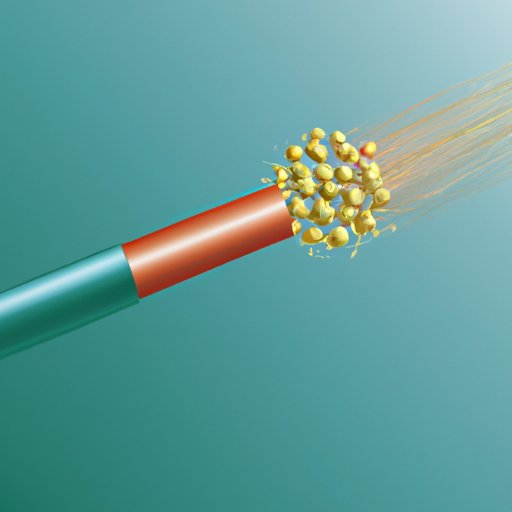Introduction
When it comes to firearms, one of the most important considerations is the speed of the projectile. The velocity of a pistol bullet can have a significant impact on the accuracy and range of a shooter’s weapon. In this article, we will explore the velocity of a pistol bullet, including factors that affect its speed, average speeds, and the physics behind it.

Analyzing the Velocity of a Pistol Bullet
Velocity is defined as the rate of change of an object’s position in a given direction over time. In the context of firearms, velocity refers to the speed at which a projectile moves after it is fired from a gun. This is an important factor when considering the accuracy and range of a weapon.
There are several factors that can affect the velocity of a pistol bullet, such as the type of ammunition used, the barrel length, and the pressure inside the chamber. All of these can have an effect on the speed of the projectile and ultimately determine how accurate and far a shooter can fire his or her weapon.
The Speed of a Pistol Bullet: A Closer Look
So, what are the average speeds of pistol bullets? According to research conducted by the National Institute of Justice, the average speed of a 9mm Luger round is 1,150 feet per second (fps). Similarly, the average speed of a .45 ACP round is 850 fps, while the average speed of a .40 S&W round is 1,030 fps.
These averages are based on standard factory ammunition, but the actual speed of a pistol bullet can vary depending on the specific ammunition used. For example, some brands of ammunition may be loaded with higher-powered propellants, resulting in faster velocities. Additionally, the barrel length of the handgun can also affect the speed of the bullet; longer barrels tend to create more velocity than shorter barrels.
In general, pistol bullets typically travel at speeds between 600 and 1,500 fps. However, it is important to note that these speeds can vary widely depending on the type of ammunition, the barrel length, and other factors.

Exploring the Physics of Pistol Bullets and Their Velocity
The velocity of a pistol bullet is determined by two main factors: kinetic energy and momentum. Kinetic energy is the energy associated with an object’s motion and is calculated as one-half of the mass times the square of the velocity. Momentum, meanwhile, is the product of an object’s mass and velocity and determines how much force is applied to a target when a bullet strikes it.
The amount of kinetic energy and momentum a bullet has is directly related to its velocity. Higher velocities result in more kinetic energy and momentum, which in turn increases the amount of damage a bullet can do when it strikes a target. Conversely, lower velocities mean less kinetic energy and momentum, resulting in less damage.
Conclusion
In conclusion, the velocity of a pistol bullet is an important factor to consider when firing a weapon. Factors such as the type of ammunition used, the barrel length, and the pressure inside the chamber all play a role in determining the speed of the projectile. On average, pistol bullets typically travel at speeds between 600 and 1,500 fps. Finally, the amount of kinetic energy and momentum a bullet has is directly related to its velocity.
Understanding the velocity of a pistol bullet is essential for any shooter looking to maximize the accuracy and range of his or her weapon. By taking into account the various factors discussed in this article, shooters can make more informed decisions about their ammunition and ensure they are using the best possible setup for their needs.
(Note: Is this article not meeting your expectations? Do you have knowledge or insights to share? Unlock new opportunities and expand your reach by joining our authors team. Click Registration to join us and share your expertise with our readers.)
